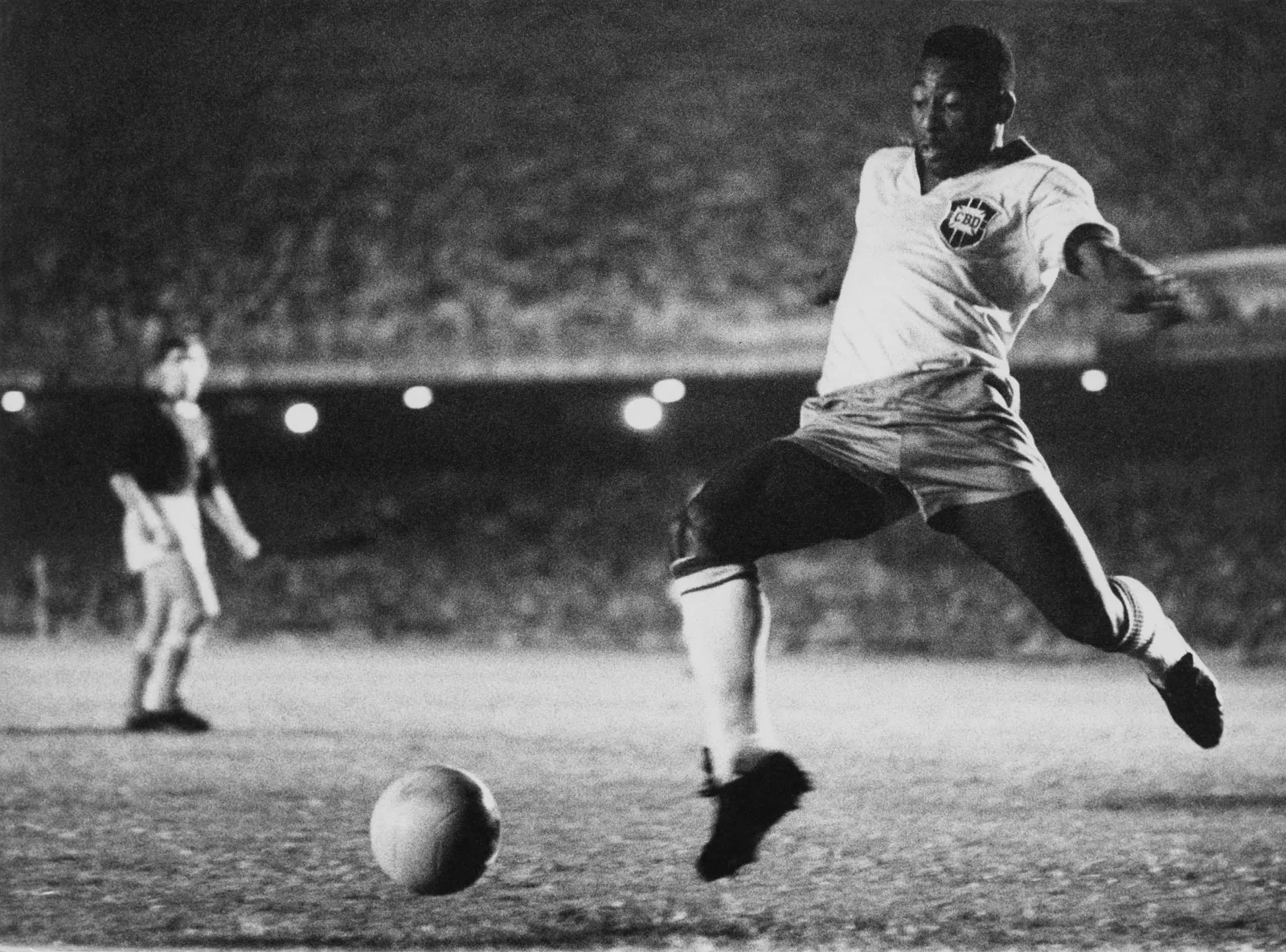Soccer History and Facts – Everything You Need To Know
If you want to learn soccer history and facts – this is for you.
Soccer, a sport that has captured the hearts of millions around the world, boasts a rich and storied history that dates back centuries.
It’s a game that has evolved over time, spreading its influence globally and becoming a symbol of unity and competition.
In this article, we’ll delve into the intriguing origins of soccer, soccer history, explore important milestones in its development, and provide a concise summary of its history.
Along the way, we’ll also uncover some fascinating and lesser-known fun facts about soccer that will deepen your appreciation for this beloved game’s remarkable journey through time.

Soccer History and Facts
In this article, you can read through all 5 sections or skip ahead to the topics that are most important to you. Make sure to watch the video tutorial at the end included and download your special free gift that is guaranteed to make you a better soccer player.
- When was soccer invented?
- Important events in soccer history
- History of soccer summary
- Fun facts about soccer history
- How to become a better soccer player, improve faster, and achieve more!
I hope this article answers all your questions about soccer history and facts. Let’s go!

When Was Soccer Invented?
The origins of soccer history can be traced back to ancient civilizations, making it a sport with a long and diverse history. While it’s challenging to pinpoint an exact date of invention, here are some key details about the early history of soccer:
- Ancient Roots: Ball games that involved kicking a ball into a goal have been played by various cultures throughout history. Ancient civilizations such as the Greeks, Romans, and Chinese all had their own versions of ball games that resembled soccer in some way.
- Early Codification: The first known standardized rules for soccer were developed at Cambridge University in the 19th century. These rules laid the foundation for modern soccer and are known as the Cambridge Rules. They emphasized kicking the ball and forbade the use of hands.
- The Formation of Football Associations: The mid-19th century saw the establishment of football associations in England, Scotland, and other European countries. The Football Association (FA) in England, founded in 1863, played a pivotal role in setting uniform rules for the game, including the introduction of goalposts and crossbars.
So, while there isn’t a single inventor or a precise date for the invention of soccer, it is a sport that gradually emerged from various ancient and medieval ball games, with rules and organization evolving over centuries to create the modern version of the game we know and love today.

Important Events In Soccer History
Soccer has a rich history filled with important events and fascinating facts. Here are some notable moments and intriguing soccer history facts you may be interested in:
- The Establishment of the FA (1863): The formation of The Football Association (FA) in England in 1863 was a watershed moment in soccer history. It led to the creation of standardized rules, including the ban on using hands to touch the ball, which laid the foundation for modern soccer.
- Introduction of Goalposts and Crossbars (1863): The FA introduced goalposts and crossbars to the game in 1863, providing a clear target for players to aim at and making scoring more systematic.
- First International Match (1872): The first international soccer match took place between England and Scotland in 1872. This historic game laid the groundwork for international competitions and the eventual formation of FIFA.
- Foundation of FIFA (1904): The Fédération Internationale de Football Association (FIFA) was founded in 1904, with the goal of overseeing and promoting international soccer competitions. This significantly contributed to the standardization of rules and the global expansion of the sport.
- Introduction of Yellow and Red Cards (1970): The use of yellow and red cards to sanction players for misconduct was introduced during the 1970 FIFA World Cup, providing a systematic way to enforce the rules and maintain fair play.
- Adoption of Three Substitutions (1958): The 1958 FIFA World Cup introduced the rule allowing each team to make up to three substitutions during a match, revolutionizing player management and tactics.
- Introduction of the Back-Pass Rule (1992): The back-pass rule, implemented in 1992, prevented goalkeepers from picking up the ball when it was deliberately passed to them by a teammate, leading to more dynamic and open gameplay.
- VAR (Video Assistant Referee) Technology (2018): The introduction of VAR technology in soccer has had a significant impact on decision-making during matches, helping referees make more accurate calls and reducing controversies.
- Expansion of Women’s Soccer (20th Century): The growth and recognition of women’s soccer have been vital in reshaping the sport’s landscape. The establishment of the FIFA Women’s World Cup in 1991 and increased investment in women’s soccer have had a lasting impact.
- Implementation of Anti-Racism Initiatives (Ongoing): Efforts to combat racism and discrimination in soccer have gained momentum over the years. Events such as the “No to Racism” campaigns by UEFA and FIFA have played a significant role in promoting equality and inclusivity in the sport.
These events, among others, have significantly shaped the way soccer is played, the rules and regulations that govern it, and the cultural and social aspects of the game. Soccer’s history is a reflection of its ongoing evolution and the efforts to make it a more equitable and enjoyable sport for all.

History of Soccer Summary
The 19th century marked a significant turning point for soccer. The standardization of rules began at Cambridge University with the creation of the Cambridge Rules, emphasizing the use of feet and outlawing the use of hands.
As the sport gained popularity, football associations were formed in different regions, with the Football Association (FA) in England, established in 1863, playing a pivotal role in setting uniform rules.
The spread of soccer beyond the British Isles occurred rapidly, with the first international match taking place in 1872 between England and Scotland.
This led to the formation of FIFA (Fédération Internationale de Football Association) in 1904 to oversee international soccer competitions. The sport continued to evolve, with the introduction of key rules, such as penalty kicks and the use of yellow and red cards.
In the modern era of soccer, the sport has witnessed globalization on an unprecedented scale, with leagues and tournaments attracting a diverse array of players and fans from around the world. Technological advancements, including VAR and goal-line technology, have enhanced the game’s fairness and accuracy.
Women’s soccer has grown significantly, gaining increased recognition and investment, while club soccer, particularly in Europe, has seen a surge in financial power and global fan engagement.

Fun Facts About Soccer History
Soccer has a rich history filled with important events and fascinating facts. Here are some notable moments and intriguing fun facts of soccer history:
- 1930 FIFA World Cup: The inaugural FIFA World Cup was held in Uruguay, making it the first-ever international soccer tournament of its kind. Uruguay emerged as the champion.
- 1958: The emergence of a teenage sensation, Pelé, who led Brazil to victory in the FIFA World Cup and became an iconic figure in world soccer.
- 1966 FIFA World Cup: England hosted and won the World Cup, and it’s remembered for Geoff Hurst’s historic hat-trick in the final against West Germany.
- 1970: The “Game of the Century” took place during the 1970 FIFA World Cup semifinal between Italy and West Germany, ending 4-3 after extra time.
- 1982 FIFA World Cup: Italy’s Paolo Rossi’s incredible comeback after a ban due to a match-fixing scandal, leading his team to victory in the tournament.
- 1986: Diego Maradona’s “Hand of God” and the “Goal of the Century” in the quarterfinal of the FIFA World Cup against England in Mexico.
- 1994 FIFA World Cup: The introduction of the penalty shootout as the tiebreaker in the World Cup.
- 1998: Zinedine Zidane’s two headers in the FIFA World Cup final, leading France to victory over Brazil.
- 2007: The introduction of goal-line technology in soccer to aid referees in determining whether a ball had crossed the goal line.
- 2021: Lionel Messi breaking Pelé’s record for the most goals for a single club, with Messi achieving this milestone at FC Barcelona.

Common Questions
Here are some common questions about soccer history and facts:
What are the most important soccer facts?
Soccer, known globally as the “beautiful game,” has several key facts that define its significance. It is the most popular sport worldwide, with over 4 billion fans.
The first World Cup was held in 1930, and Brazil holds the record for the most World Cup titles, winning it five times. The FIFA World Cup is the most watched sporting event globally, surpassing the Olympics in viewership.
The fastest goal in soccer history was scored just 2.8 seconds into a match by Nawaf Al-Abed of Saudi Arabia. Soccer is played in every country, and the game’s development has seen it become a central part of national cultures around the world, promoting unity, passion, and competition.
Why is soccer called soccer?
The term “soccer” originates from an abbreviation of “association football,” the formal name for the game. In the late 19th century in England, there were multiple types of football being played.
To distinguish association football from rugby football, people started calling it “soccer,” derived from the “assoc” in “association.”
While the term “football” was widely used internationally, in the United States, Canada, and a few other countries, “soccer” remained common to avoid confusion with American and Canadian football.
Today, “soccer” is primarily used in these regions, while most of the world continues to call it “football.”
Who won the first World Cup?
The first FIFA World Cup was won by Uruguay in 1930.
The tournament was held in Uruguay’s capital, Montevideo, and the host nation emerged as champions after defeating Argentina 4-2 in the final.
Uruguay’s victory was significant not only because they were the host country but also because the tournament was the first of its kind, establishing the foundation for what would become the world’s most prestigious football competition.
The tournament’s success helped grow soccer’s global presence.
What countries call it soccer?
In most of the world, the game is referred to as “football,” but in countries like the United States, Canada, and a few others, “soccer” is the term used.
The United States adopted the term during the late 19th century when rugby football was already popular, and the sport of association football needed a distinct name.
Canada follows a similar convention, influenced by its proximity to the U.S. and the influence of both American football and Canadian football.
Other nations where “soccer” is used, though less common, include some Caribbean nations and certain parts of Asia.
Who invented the soccer ball?
The invention of the soccer ball is attributed to Charles Goodyear, an American inventor.
In the mid-1800s, Goodyear developed a vulcanized rubber process and produced the first durable soccer ball made from rubber. Prior to that, soccer balls were made from animal bladders and sewn together leather.
Goodyear’s innovation helped revolutionize the manufacturing of sports balls, making them more resilient and reliable for playing. His contribution helped standardize soccer balls for competitions and leisure play globally.
Is soccer the most popular sport in the world?
Yes, soccer is the most popular sport in the world.
It has an estimated 4 billion fans globally, more than any other sport. The sport is played professionally in almost every country, with leagues in countries such as England, Spain, Italy, Brazil, and many others holding enormous global followings.
Events like the FIFA World Cup draw billions of viewers from all around the world, and major football clubs like FC Barcelona, Manchester United, and Real Madrid boast enormous fanbases.
Soccer’s worldwide appeal transcends borders, languages, and cultures, making it a powerful force in global sports culture.

SOCCER PLAYERS
Want to become a better soccer player?
Watch this 3-minute video about discovering your true potential
Learn how to improve your skills, mindset, soccer IQ, and fitness—no matter your level. Start playing with confidence, earning respect, and impressing coaches today.
About Coach Dylan
I used to struggle with confidence in soccer, feeling slow, weak, and unmotivated. Coaches overlooked me, and friends made fun of my skills. At one point, I even quit.
But I decided to take control of my development. Through hard work, I transformed my game, earned league titles, awards, a college scholarship, and international caps.
Now, I share my lessons and help others improve through my YouTube channel (1/2 million subscribers), soccer coaching and personal training.

How To Play Soccer Better
Struggling to make progress in soccer or stay organized with your training?
The Soccer Success Planner will help you stay focused, motivated, and increase your chances of achieving your goals in soccer.
Success doesn’t happen accidentally. Use it to set clear goals, create a plan of action, and take control of your future. Learn more about the Soccer Success Planner.
How To Become A Better Soccer Player
Struggling to improve in soccer or unsure how to train effectively? Want to stand out and earn respect from teammates and coaches?
The Online Soccer Academy will get you better results in less time.
Thousands of players have already transformed their game in just 60 days. Learn more about how the online soccer academy.

Related Posts
Here are some related posts to help you gain more knowledge and helpful advice:
How to be successful in soccer
How to get MATCH FIT for soccer
Coach Dylan
Progressive Soccer
Thank you for reading this article:
Soccer History and Facts – Everything You Need To Know
